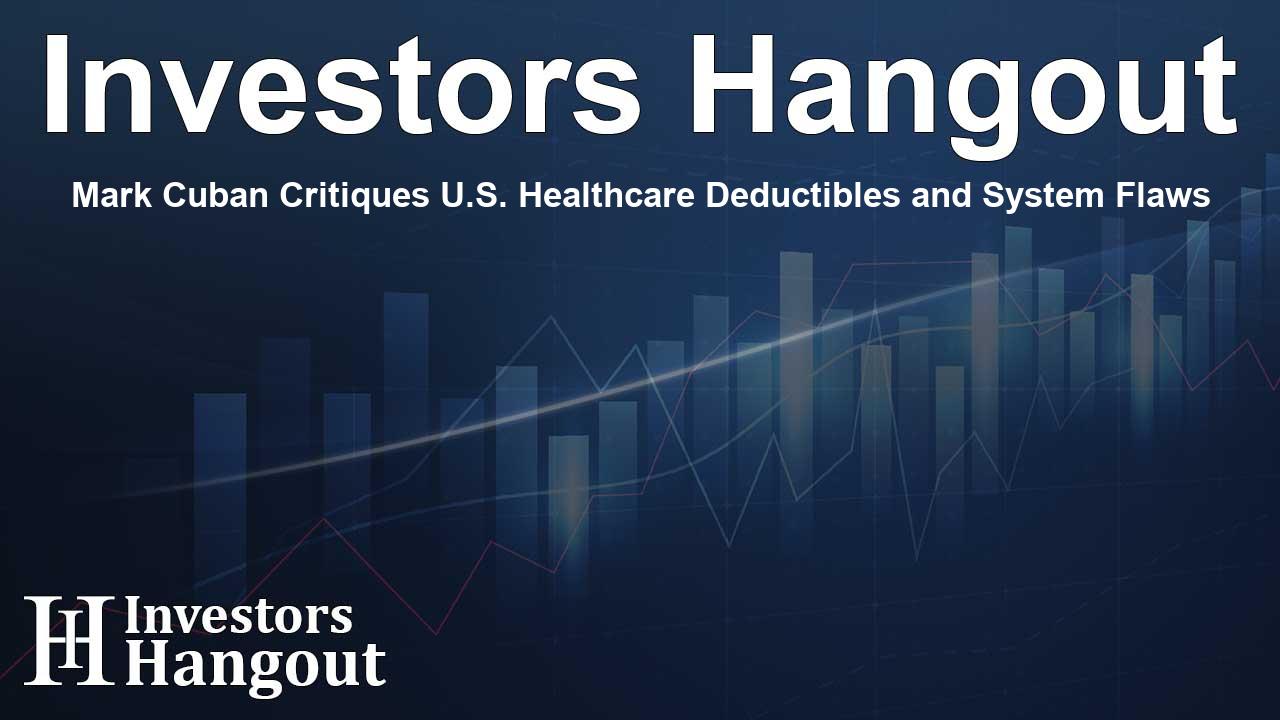Mark Cuban Critiques U.S. Healthcare Deductibles and System Flaws

Mark Cuban Highlights Deductibles as Healthcare's Major Flaw
Mark Cuban, a billionaire entrepreneur and owner of the Dallas Mavericks, has recently emerged as a vocal critic of the U.S. healthcare system. He boldly labeled it as "f****d up," emphasizing that deductibles are the "biggest problem in healthcare." According to him, these deductibles are crafted by insurance companies and create numerous challenges for both patients and healthcare providers.
The Real Problem with Deductibles
Cuban expounded on his views in a recent post on X, explaining how insurance companies prefer plans with higher deductibles that come with lower premiums. This strategy puts the burden of collecting bills on doctors and hospitals, which he finds deeply problematic. He asserts that deductibles represent the amount patients must pay before their insurance takes effect, and often patients opt for the cheapest premium plans, even if they carry higher deductibles.
How Deductibles Affect Patient Care
He pointed out that many individuals choose these high-deductible plans because they generally feel healthy or because they are constrained by budgetary limits. However, this decision can lead to significant out-of-pocket expenses that dissuade patients from seeking necessary medical care. Consequently, hospitals and doctors inadvertently become bill collectors, without any control over the insurance plan structures that patients elect.
Cuban's Call for a System Overhaul
"That is one messed-up system that needs to be redesigned," Cuban said. His remarks stress the urgent need for reformation in healthcare, advocating for a shift that benefits patients rather than the insurance companies. He called for an overhaul that would address the tactical delays and claims denials prevalent in the insurance sector, which not only affect patient treatment access but also the overall financial stability of healthcare providers.
The Ripple Effects of High Deductibles
High deductibles significantly contribute to financial strain on patients. These out-of-pocket costs can hinder necessary medical treatments, delaying care until conditions worsen, which can result in higher expenses in the long run. Patients often find themselves trapped under the dual pressures of financial obligation and inadequate healthcare access, creating a cycle of medical debt and deteriorating health.
Why This Matters for Investors and the Industry
Cuban's insights also resonate with investors observing the healthcare landscape. The ongoing frustrations regarding deductible costs are poised to impact healthcare utilization trends. As a result, insurance sector ETFs, such as iShares US Insurance ETF (IAK), Invesco KBW Property & Casualty Insurance ETF (KBWP), and SPDR S&P Insurance ETF (KIE), might face shifts in performance due to changing public sentiments about healthcare affordability.
A Glimpse at Performance of Insurance Sector ETFs
Investors have been keeping a close eye on performance metrics of various insurance ETFs amid these unfolding discussions around healthcare reforms. For instance, here are some current performances:
- iShares US Insurance ETF (IAK): 3.66% YTD, 17.32% One Year Performance
- Invesco KBW Property & Casualty Insurance ETF (KBWP): -0.33% YTD, 12.48% One Year Performance
- SPDR S&P Insurance ETF (KIE): 3.30% YTD, 17.59% One Year Performance
These performance indicators can reflect broader trends influenced by public discourse, regulatory changes, and evolving patient needs and attitudes.
Final Thoughts on Healthcare Deductibles
Mark Cuban's outspoken criticism of high deductibles and the healthcare system serves as a crucial reminder of the need for balance between affordability and access to care. As healthcare continues to be a contentious issue in the U.S., stakeholders must prioritize patient welfare and aim for a system that is designed for fairness and efficiency, rather than corporate profit.
Frequently Asked Questions
What are the concerns Mark Cuban raised about healthcare deductibles?
Mark Cuban highlighted that high deductibles create financial barriers to medical care and put undue pressure on healthcare providers to collect payments, thus calling for a redesign of the system.
How do deductibles affect patients financially?
High deductibles can lead to significant out-of-pocket expenses, making patients hesitant to seek necessary medical care, which can worsen health conditions over time.
What changes does Cuban suggest for the U.S. healthcare system?
Cuban advocates for a restructured healthcare system that prioritizes patient well-being, reduces insurance company influence, and aims for fairness in both care access and provider reimbursements.
Why should investors care about healthcare reforms?
Healthcare reforms can affect insurance sector performances, making it important for investors to understand the potential impacts on related ETFs and market dynamics.
Which ETFs are relevant in the discussion of healthcare reform?
Several ETFs are relevant, including iShares US Insurance ETF (IAK), Invesco KBW Property & Casualty Insurance ETF (KBWP), and SPDR S&P Insurance ETF (KIE), which track various aspects of the insurance market.
About The Author
Contact Olivia Taylor privately here. Or send an email with ATTN: Olivia Taylor as the subject to contact@investorshangout.com.
About Investors Hangout
Investors Hangout is a leading online stock forum for financial discussion and learning, offering a wide range of free tools and resources. It draws in traders of all levels, who exchange market knowledge, investigate trading tactics, and keep an eye on industry developments in real time. Featuring financial articles, stock message boards, quotes, charts, company profiles, and live news updates. Through cooperative learning and a wealth of informational resources, it helps users from novices creating their first portfolios to experts honing their techniques. Join Investors Hangout today: https://investorshangout.com/
The content of this article is based on factual, publicly available information and does not represent legal, financial, or investment advice. Investors Hangout does not offer financial advice, and the author is not a licensed financial advisor. Consult a qualified advisor before making any financial or investment decisions based on this article. This article should not be considered advice to purchase, sell, or hold any securities or other investments. If any of the material provided here is inaccurate, please contact us for corrections.
